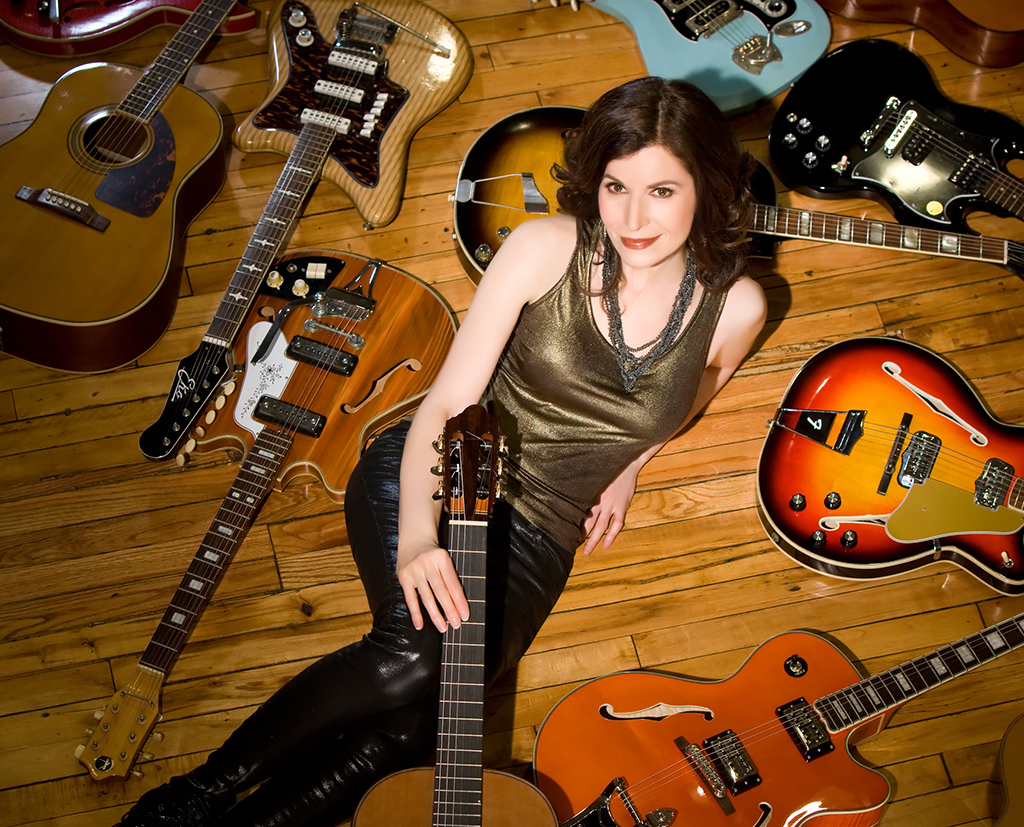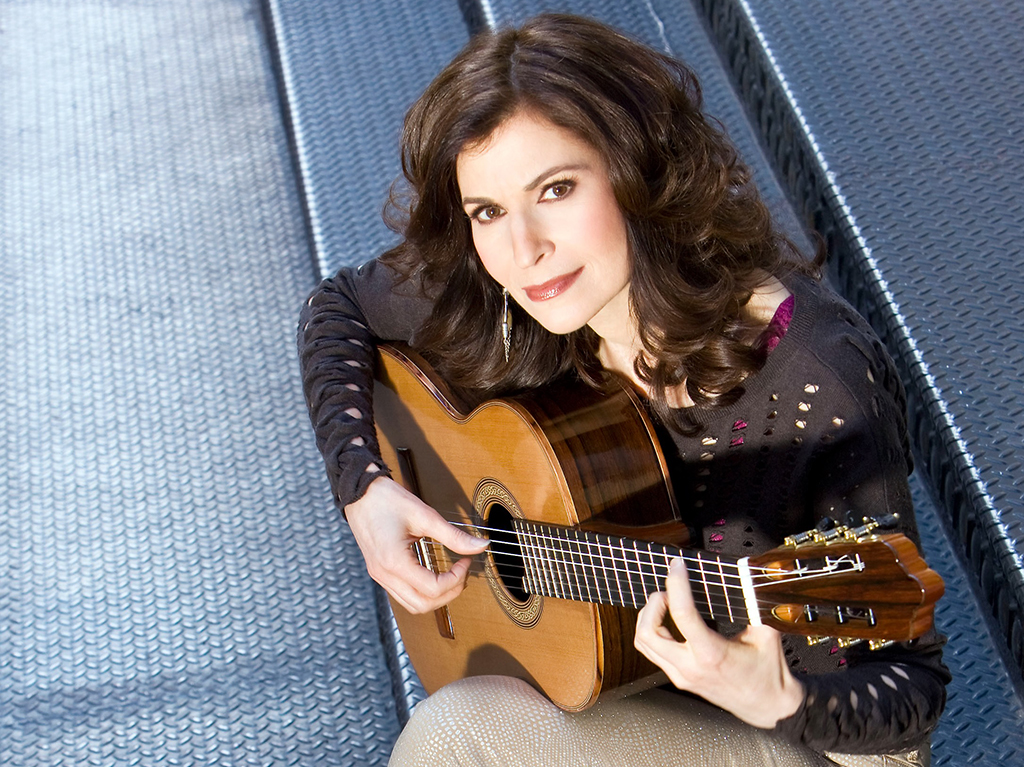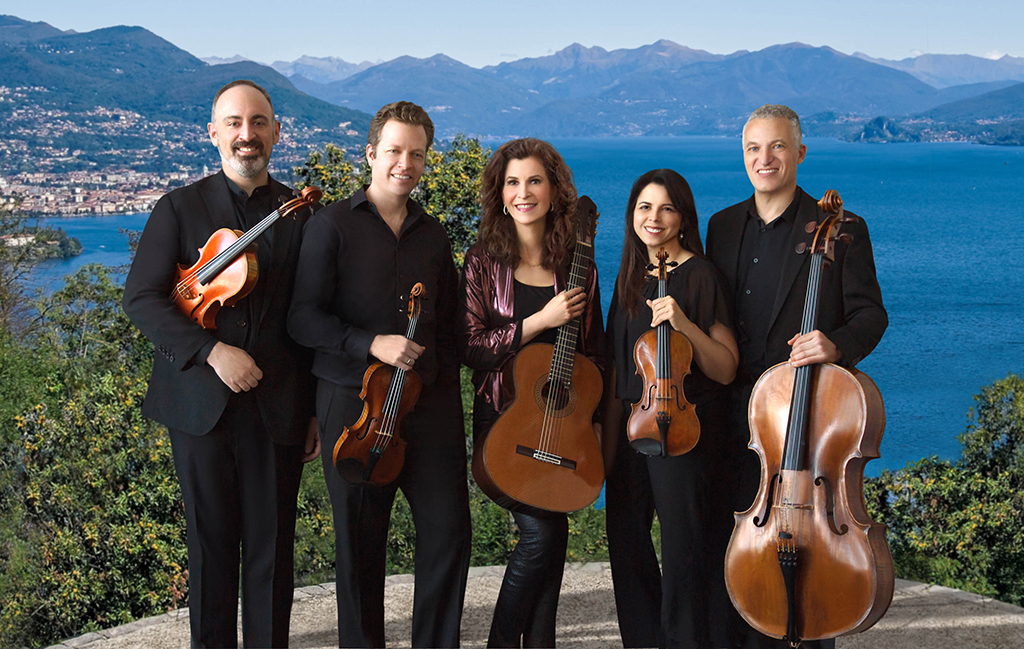One of the many artists appearing at the Krannert Center’s ELLNORA | The Guitar Festival is Sharon Isbin, a guitarist who has won multiple Grammy awards and was recognized by Musical America as their 2020 Instrumentalist of the Year. She also received the Artistic Achievement Award from the Guitar Hall of Fame in June and was inducted into the organization’s Hall of Fame. Her awards are well-deserved and speak volumes about the breadth of technique and knowledge that she has about the classical guitar. What her awards can’t quantify, however, is the joy she brings to her musical collaborations.
Isbin will perform with the Pacifica String Quartet as the five artists are celebrating their seventh year of collaboration. Smile Politely caught up with Isbin while she was traveling to the Ellnora festival.
Smile Politely: How has your collaboration with the Pacifica Quartet grown and changed in the seven years since you started at Aspen?
Sharon Isbin: It’s amazing that it’s been so long! After the Aspen concert, our work has been a series of projects—they’ve asked, and I’ve said yes! We’d really like to do a tour with you. (Sure!!) We’d love to make a recording. (Souvenirs of Spain & Italy, available from Çedille Records.) We’d love to commission some new music for guitar and string quartet with you. (Joseph Schwantner’s Song of a Dreaming Sparrow, 2020, appearing on the ELLNORA program.)
SP: Since you and the quartet have such a rich collaborative relationship, what do you expect listeners to hear at the concert?
Isbin: The versatility of the guitar and how it meshes with the string quartet. I’ve tried to represent pieces from across the guitar’s Latin American homes like Venezuela and Paraguay and not only from Spain & Italy—those are well represented from the Souvenirs album. The Vivialdi’s “Largo” movement relies on Baroque performance practice to reproduce how I think it could actually have been played.

SP: One of the real joys of playing Baroque music is the room for performer interpretation and participation that some later composers micro-manage. How have you made these choices?
Isbin: I’ve drawn on training in all kinds of disciplines: French, German, and Spanish language training, musicology and music history, and philosophy. When I was studying, there wasn’t a guitar program at Yale, so I had to follow what interested me as it fit with what they offered. After I graduated I chose my own teacher, Rosalyn Tureck—the famous New York pianist, harpsichordist, and J.S. Bach scholar—to learn Baroque performance practice. Her approach saw me create performing editions of the Bach Lute Suites, adding Baroque flourishes and ornaments, phrasing, articulation, and dynamics. Audiences can’t imagine the hundreds of hours that go into performing even a short piece like that. It’s really like being an actor on stage: there’s technicality and execution as well as expression, the choice to produce specific colors in combination. No other instrument has this breadth of capacity.
SP: How did studying philosophy affect your perspective or your approach?
Isbin: It’s more that the practice of philosophy kept me thinking than it was reading the work of any particular thinker. Philosophy very naturally promotes digging for deep questions and wrestling with problems that may not have a clear solution. It has a cumulative effect of inspiring curiosity, deep thinking, provoking the process, and finding joy in probing deeper. I think that anyone who has spent time really learning an instrument will understand the similarities between the two.
SP: You have a proven record of championing new music as well as playing classics. What really makes a piece of music stick out to you as particularly substantive or expressive?
Isbin: Can I hear [the composer’s] voice in their writing for guitar? Can I imagine this? Does it give me goosebumps? Is it emotionally resonant? I’ve worked with Joan Baez, with Mark O’Connor on Journey to the New World, with Nancy Wilson . . . their work really grabs me. The technical craft is important—that’s true of any art—but so are the years of dedication and heart that the artist brings into it. Anymore, I can tell in the first two minutes if a piece is going to be something that I want to play. I’m not a composer myself, but I can recognize if someone is on track.
SP: Joseph Schwanter is one composer who seems to have struck this balance of craft, emotional resonance, and sincere voice. His chamber music tends to mix winds and strings. Do you hear any influence from his wind writing come through when he writes for strings only?
Isbin: His enthusiasm for the guitar as a kid has informed so much of his writing. In his guitar fantasy (From, Afar . . ., 1988) you can hear wind instruments spinning off the harmonies of the guitar. Combining guitar and string quartet in Song of a Dreaming Sparrow (2020) is a completely different animal in terms of combining textures,

SP: As a soloist and as a collaborative member of a string quintet, what’s in regular rotation on your record shelf?
Isbin: It changes from month to month. I listen to everything from Loreena McKennitt, a wonderful Canadian artist for her dreamy, evocative sound; Joan Baez since long before I ever met her; Nancy Wilson for how she blends flamenco and classical guitar with hard rock, Working in the guitar dept at Julliard means I’m also listening to candidates and student composers. On Labor Day I played sections of Karen LeFrack’s Miami Concerto with the National Symphony. I’m doing the full premiere with Miami in January, so that’s been taking up a lot of listening time. Chris Brubeck’s Affinity (2015) is still a favorite, inspired by both his jazz background and Middle Eastern music. There’s a section in the middle dedicated to his dad’s Autumn that is really great.
SP: What are you looking forward to at the festival?
Isbin: Ellnora is really unique in my experience in the world. It combines an extraordinary venue with the inventiveness of the artists who participate in such a short space. Everyone’s always crossing paths at each others’ concerts or in the Krannert lobby. Part of the joy of that is that listeners can meet the musicians and have wonderful conversations. I have never seen anything quite like it, and the community is so fortunate to have such learning and immersion at their fingertips every two years.
Sharon Isbin and the Pacifica Quartet will appear as part of the ELLNORA | The Guitar Festival at the Krannert Center for the Performing Arts in Foellinger Great Hall. The concert is free and open to the public.
Sharon Isbin and the Pacifica Quartet
ELLNORA | The Guitar Festival
Krannert Center for the Performing Arts
Urbana
Sa September 9th, 11 a.m.
Free








